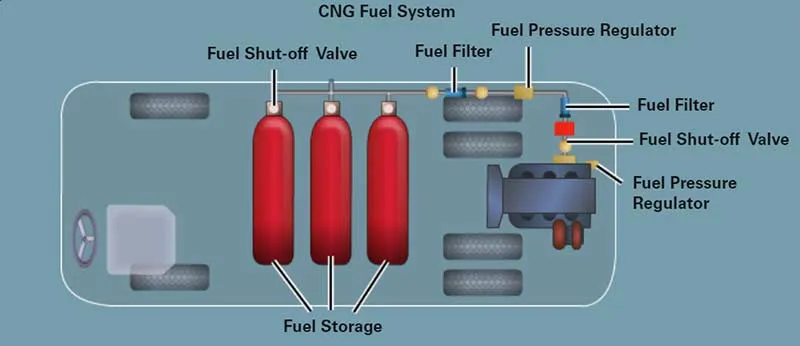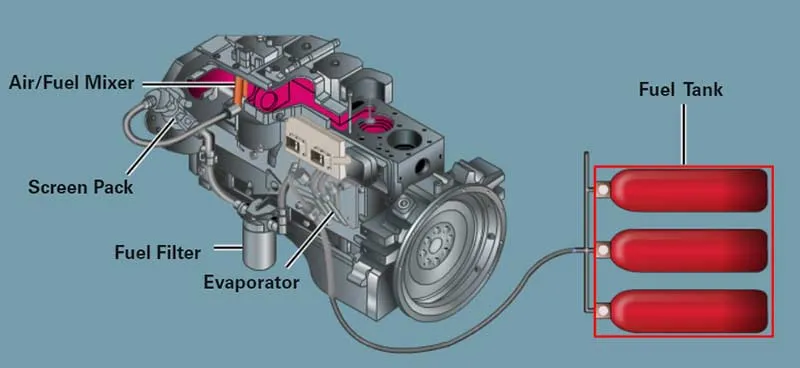Diesel Truck Maintenance: Essential Tips for Longevity
Preventative maintenance on your diesel truck can make a big difference. We share why it's important and a complete preventative maintenance checklist.
If you’re an experienced diesel technician or are considering a career in the field, you may be familiar with the various types of natural gases, which serve as an alternative to conventional petroleum-based fuels.
The world we live in today relies heavily on diesel fuel, but due to environmental concerns and cost efficiency, more and more industries are turning to CNG, LPG and LNG fuel. In the last decade, we’ve seen new applications for natural gas emerge in the transportation, retail and industrial sectors. As a result, it’s important for today’s diesel technicians to stay ahead of the curve and understand these different types of gases and how they work.
Keep reading to learn the basics of CNG, LPG and LNG fuel and how these natural gases are impacting the industry and the future of your career.
In the diesel industry, you will hear the acronym CNG used quite often. You may have even seen the blue diamond CNG sticker on commercial vehicles and mass transit busses and wondered, “What is CNG fuel?
CNG stands for compressed natural gas. It is the gaseous product of petroleum and is the first product that is separated during the distillation process. CNG is odorless, tasteless and non-toxic, and is made up of 93.05% methane, nitrogen, carbon dioxide, propane and traces of ethane. It is an environmentally clean alternative fuel, as its combustion process emits a lower percentage of greenhouse gases when compared to other fuels.

While CNG fuel won’t give you the same amount of power that would come from diesel fuel, it certainly has its advantages. CNG has a high octane rating that provides a high compression ratio and is adaptable to modern engines. The combustion of CNG produces less carbon monoxide, hydrocarbons and oxides of nitrogen. Overall, this type of gas can help in reducing pollution, as it is a clean burning fuel.
In addition to CNG fuel, LPG and LNG are two other common alternatives to gas and diesel fuel. Each of these types of fuels have both similarities and differences.
LPG fuel, or liquefied petroleum gas, is a liquefied gas and is a byproduct derived while extracting crude petroleum. LPG weighs twice as much as air and is colorless, odorless and is a highly flammable explosive gas. It is comprised of propane mixed with butane, traces of propylene and butylene.

One of the advantages of LPG is that it emits less hydrocarbons, carbon monoxide and oxides of nitrogen. It also has a high octane rating and increases engine longevity. The fuel weight-to-mileage of LPG is equal to that of gasoline-operated vehicles.
LNG fuel, or liquefied natural gas, is a natural gas converted to liquid form through liquefaction. During this process, natural gas is cooled at low temperatures until it turns into a liquid, and the volume of gas is reduced by approximately 600 times.

LPG is comprised of 95% methane, and other components include nitrogen, ethane, carbon dioxide and propane. It is non-toxic and non-corrosive, resulting in less pollution. It occupies 1/600 the volume as natural gas, making it much more cost-effective for storage and transportation.
While liquefied natural gas and compressed natural gas are similar, their delivery and storage methods are different.
LNG is frozen in order to turn it into liquid form, whereas CNG is pressurized to the point where it is very compact. LNG takes up less storage space on a vehicle than CNG, and it also offers an energy density that can be compared to diesel fuel. This makes it a common choice among many long-haul trucking companies. Using proper procedures, LNG can be converted to CNG.
On the other hand, CNG is easier to refuel than LNG, which requires special handling and equipment. CNG is also very light, so if there is a leak, it will dissipate. It has an unlimited hold time, so even if it goes unused, there is no fuel loss. This makes CNG a safer choice over LNG. CNG also has lower production costs than LNG.
CNG and LPG fuel also have both similarities and differences. While CNG is comprised of methane, LPG is comprised of propane and butane. CNG is typically used as a substitute for gasoline in automobiles, while LPG is often used in the industrial, refrigeration, agricultural and catering industries. It is also used to power cooking and heating in homes, and like CNG, can be used as automobile fuel.
CNG releases less greenhouse gas, while LPG releases carbon dioxide, but is still cleaner than gasoline. In the case of a spill, CNG quickly dissipates, whereas LPG will settle on the ground. In general, CNG is considered safer than LPG, since LPG is difficult to disperse.
Knowing about the different types of alternative fuels can benefit you greatly in your diesel career. There is a growing demand for technicians who are able to work on applications that run on these fuels, but not enough candidates who have the right skills. This skills gap is opening the door to exciting opportunities for those who are preparing for careers in the diesel industry.
Having CNG, LPG and LNG qualifications on your resume can give you a competitive advantage and make you more valuable as a technician overall. Construction equipment, trucks, agricultural equipment and many other applications have already made the switch to natural gas, which means a new generation of technicians will be needed to keep them up and running.
Technicians who possess knowledge of alternative fuels often work for transit authorities, an engine manufacturer or dealer, and in the power generation industry. Today, nearly every manufacturer makes something that runs on natural gas. No matter where you go to work, you will most likely be exposed to working with these types of fuels—especially as their popularity grows.
UTI’s 45-week Diesel Technology program is designed to provide you with a foundation of knowledge you can build upon in the diesel industry.1
In addition to learning concepts like truck preventive maintenance, diesel fuel systems and transportation refrigeration, your coursework will cover the different types of alternative fuels and the applications that run on them. Graduates are well prepared to complete ASE examinations and can substitute their training for one of the two years of work experience required to become ASE certified.
As a UTI student, you could also elevate your training with manufacturer-specific education. Created in conjunction with leading brands, UTI’s specialized training programs are designed to set you apart as a technician and provide you with the skills employers look for.
If pursuing a career in the diesel industry is a passion of yours, UTI is a good place to complete your training. You’ll have the chance to learn alongside other students who share your same passions and work with the equipment and technology used by the industry. Along the way, you’ll have the support of instructors who will be there to mentor you as you complete your program and work toward graduation.
UTI’s Diesel Technician Training program is offered at campus locations nationwide. To learn more, visit our program page and request information to get in touch with an Admissions Representative.
Universal Technical Institute of Illinois, Inc. is approved by the Division of Private Business and Vocational Schools of the Illinois Board of Higher Education.